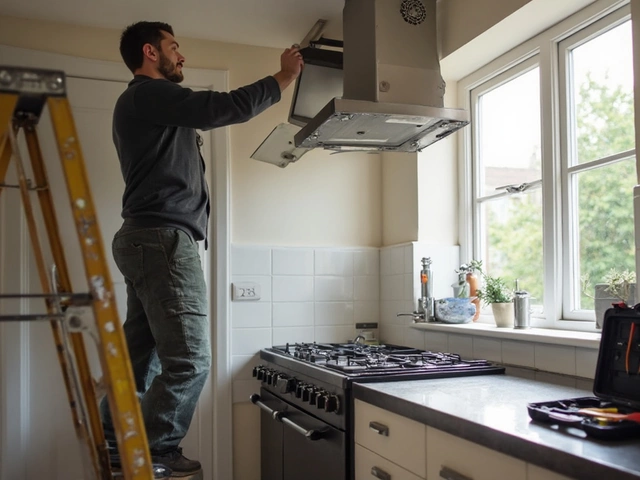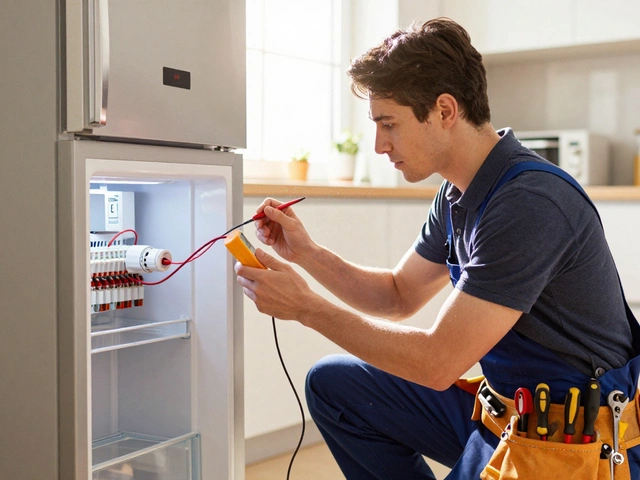Bad Hot Water Heater Element: How to Spot It Fast
May 17 2025Home Maintenance Tips: Keep Your House Running Smoothly
Nothing feels worse than a broken boiler in the middle of winter or a kitchen fan that stops working right before dinner. The good news is most of these problems can be stopped before they start. Below are easy, everyday actions you can take to protect your appliances and avoid pricey emergency calls.
Keep Your Boilers and Water Heaters in Check
Boiler servicing isn’t just a yearly chore – it’s a safety check. Skipping the service can raise your gas bill, cause noisy operation, and even create a fire risk. Set a calendar reminder for the same month each year and let a certified gas engineer look for leaks, corrosion and pressure issues.
Water heaters need a similar routine. Sediment builds up at the bottom of the tank and makes the heater work harder. The simplest fix is a flush: turn off the power or gas, attach a garden hose to the drain valve, and let the water run until it’s clear. If you prefer, a full drain and refill works too, but the flush is quicker for most homes.
Watch for warning signs – strange noises, lukewarm water, or a sudden rise in energy bills. When you notice any of these, it’s time to call a professional before a minor fault turns into a full‑scale replacement.
Look After Your Kitchen and Bathroom Fans
Extractor fans do more than keep smells away; they stop moisture from turning into mould. Clean the fan grille and replace the filter every few months. A quick vacuum or a damp cloth will clear out grease, and fresh filters keep airflow strong.
If a fan stops working, start with the basics: turn off the circuit breaker, check the wiring for loose connections, and make sure the fan isn’t blocked by debris. Many issues are simple fixes you can do yourself, but if the motor hums and won’t spin, call an electrician or a gas‑engineer who specialises in ventilation.
Regular checks also help you spot early wear. A fan that makes more noise than usual or runs hot may need a motor replacement. Replacing a motor is usually cheaper than swapping the whole unit.
Other appliances follow the same pattern – keep ovens, fridges, freezers and dishwashers clean, check seals, and listen for odd sounds. For ovens, a faulty heating element can be swapped in an hour with the right tools. Freezers benefit from a quick defrost and a clean coil every six months.
When you’re not sure whether to repair or replace, weigh the age of the item against the repair cost. A brand‑new model often runs more efficiently and can lower your energy bill, but a small fix on a five‑year‑old appliance is usually the smarter move.
Finally, write down every maintenance task you complete. A simple notebook or phone note helps you see patterns and plan the next service before something breaks. Consistent care keeps your home safe, your bills down, and your peace of mind intact.
 14 May
14 May
Freezer Not Freezing? Real Reasons and Quick Fixes
When your freezer stops freezing, it’s more than a hassle—it can ruin your food and cost you real money. This article breaks down why a freezer might quit working, the first things you should check, and what you can fix yourself before calling a repair pro. You’ll get real tips based on what actually goes wrong inside your appliance. Look out for warning signs you might have missed. Practical advice, clear steps, and a few surprises about freezer quirks—all from the perspective of someone who’s had to rescue melting ice cream at 10pm.
Read More... 8 May
8 May
How Long Should a Water Heater Last? Know When to Repair or Replace
Wondering how long your water heater should actually last before it starts acting up? This article breaks down the average lifespan of different water heater types and what really impacts their longevity. You'll learn how to spot early warning signs and get practical tips on keeping your heater running longer. We’ll also cover when a simple repair makes sense versus when it’s smarter to just replace the whole unit. Get all the details so you can avoid cold showers and wasted money.
Read More... 23 Apr
23 Apr
Can a Plumber Fix a Boiler? What You Need to Know About Boiler Repair
Wondering if a plumber can sort out your boiler troubles? This article breaks down when a plumber is the right person to call, and when you’ll need a specialist. You'll learn the difference between plumbers and boiler engineers, what legal rules apply, and how to spot the right pro for your job. From simple leaks to major breakdowns, get the facts straight so you don’t waste time—or risk your safety. Plus, some handy tips to keep your boiler humming all year round.
Read More... 18 Dec
18 Dec
Should You Repair a 20-Year-Old Water Heater? Expert Insights and Tips
Considering whether to repair a 20-year-old water heater involves evaluating various factors like ongoing efficiency, safety concerns, and repair costs. Over time, water heaters lose efficiency, potentially leading to increased energy bills and less reliability. Repairs for aging units can become frequent and costly, making replacement a more attractive option in certain scenarios. By understanding the implications and exploring tips from experts, homeowners can make informed decisions about whether to repair or replace. This article provides insights and guidance to help you decide the best course of action for your water heater needs.
Read More... 11 Dec
11 Dec
Signs You Need to Replace Your Hot Water Heater
A hot water heater is an essential appliance in any home, providing warm water for showers, cooking, and cleaning. However, these systems don't last forever, and knowing when to replace them is crucial to avoid inconvenience and potential damage. Common signs of a failing water heater include inconsistent water temperature, discolored water, strange noises, and leaks. Regular maintenance can extend the lifespan of your heater, but recognizing the right time for a replacement is key to maintaining comfort and efficiency in your home.
Read More...



